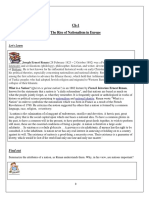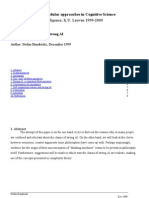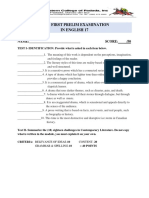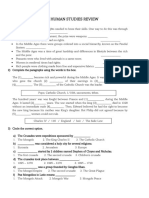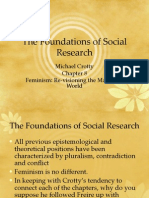0 ratings0% found this document useful (0 votes)
182 viewsQuiz Crotty Chapter 9
Quiz Crotty Chapter 9
Uploaded by
Lindsay R. CalhounThe document contains 8 multiple choice questions about key concepts from Chapter 9 of Crotty's text including: 1) Modernism's faith in science to discover absolute knowledge; 2) Postmodernism questioning generalized truths; 3) Michel Foucault developing concepts of discursive formations and archaeology of knowledge; 4) Ferdinand de Saussure's theory of the arbitrary nature of the linguistic sign, signifier and signified; 5) Roland Barthes writing about cultural phenomena; 6) Henry Milner's 5 characteristics of structuralism; 7) Post-structuralism questioning structuralism while post-modernism questions concepts of modernity; 8) Gilles Deleuze being concerned with difference.
Copyright:
Attribution Non-Commercial (BY-NC)
Available Formats
Download as DOC, PDF, TXT or read online from Scribd
Quiz Crotty Chapter 9
Quiz Crotty Chapter 9
Uploaded by
Lindsay R. Calhoun0 ratings0% found this document useful (0 votes)
182 views1 pageThe document contains 8 multiple choice questions about key concepts from Chapter 9 of Crotty's text including: 1) Modernism's faith in science to discover absolute knowledge; 2) Postmodernism questioning generalized truths; 3) Michel Foucault developing concepts of discursive formations and archaeology of knowledge; 4) Ferdinand de Saussure's theory of the arbitrary nature of the linguistic sign, signifier and signified; 5) Roland Barthes writing about cultural phenomena; 6) Henry Milner's 5 characteristics of structuralism; 7) Post-structuralism questioning structuralism while post-modernism questions concepts of modernity; 8) Gilles Deleuze being concerned with difference.
Original Description:
Quiz Crotty Chapter 9
Copyright
© Attribution Non-Commercial (BY-NC)
Available Formats
DOC, PDF, TXT or read online from Scribd
Share this document
Did you find this document useful?
Is this content inappropriate?
The document contains 8 multiple choice questions about key concepts from Chapter 9 of Crotty's text including: 1) Modernism's faith in science to discover absolute knowledge; 2) Postmodernism questioning generalized truths; 3) Michel Foucault developing concepts of discursive formations and archaeology of knowledge; 4) Ferdinand de Saussure's theory of the arbitrary nature of the linguistic sign, signifier and signified; 5) Roland Barthes writing about cultural phenomena; 6) Henry Milner's 5 characteristics of structuralism; 7) Post-structuralism questioning structuralism while post-modernism questions concepts of modernity; 8) Gilles Deleuze being concerned with difference.
Copyright:
Attribution Non-Commercial (BY-NC)
Available Formats
Download as DOC, PDF, TXT or read online from Scribd
Download as doc, pdf, or txt
0 ratings0% found this document useful (0 votes)
182 views1 pageQuiz Crotty Chapter 9
Quiz Crotty Chapter 9
Uploaded by
Lindsay R. CalhounThe document contains 8 multiple choice questions about key concepts from Chapter 9 of Crotty's text including: 1) Modernism's faith in science to discover absolute knowledge; 2) Postmodernism questioning generalized truths; 3) Michel Foucault developing concepts of discursive formations and archaeology of knowledge; 4) Ferdinand de Saussure's theory of the arbitrary nature of the linguistic sign, signifier and signified; 5) Roland Barthes writing about cultural phenomena; 6) Henry Milner's 5 characteristics of structuralism; 7) Post-structuralism questioning structuralism while post-modernism questions concepts of modernity; 8) Gilles Deleuze being concerned with difference.
Copyright:
Attribution Non-Commercial (BY-NC)
Available Formats
Download as DOC, PDF, TXT or read online from Scribd
Download as doc, pdf, or txt
You are on page 1of 1
Quiz Crotty Chapter 9
1. Fill in the blank.
Modernism, then, in the sense of modernity and modernization, evince great faith
in the ability of _____________ to discover absolute forms of knowledge.
2. Complete the sentence.
Where modernism purports to base itself on generalized, indubitable truths about
the way things really are, postmodernism
____________________________________.
3. Who developed concepts of “discursive formations” and “the archaeology of
knowledge”?
4. signifier is ____________, signified is _____________ and the linguistic sign is
arbitrary according to _________________________
5. Who wrote about wrestling, stripteases, and the black soldier saluting the French
Flag?
6. Name Milners five characteristics of structuralism.
7. Explain the difference between post-structuralism and post-modernism.
8. Which postmodern theorist was concerned with difference?
You might also like
- The Foundations of Social Research CH 6Document18 pagesThe Foundations of Social Research CH 6Lindsay R. Calhoun80% (5)
- The Foundations of Social Research CH 6Document18 pagesThe Foundations of Social Research CH 6Lindsay R. Calhoun80% (5)
- Mediocracy: The Politics of the Extreme CentreFrom EverandMediocracy: The Politics of the Extreme CentreRating: 4 out of 5 stars4/5 (12)
- 6th Central Pay Commission Salary CalculatorDocument15 pages6th Central Pay Commission Salary Calculatorrakhonde100% (436)
- 6th Central Pay Commission Salary CalculatorDocument15 pages6th Central Pay Commission Salary Calculatorrakhonde100% (436)
- Unilag MIT SampleDocument4 pagesUnilag MIT Samplebdian100% (1)
- The Foundations of Social Research CH 9Document27 pagesThe Foundations of Social Research CH 9Lindsay R. Calhoun100% (7)
- The Foundations of Social Research CH 4Document29 pagesThe Foundations of Social Research CH 4Lindsay R. Calhoun100% (7)
- The Foundations of Social Research CH 2Document28 pagesThe Foundations of Social Research CH 2Lindsay R. Calhoun77% (13)
- Name: - Score: - Test 1. Multiple Choices. Encircle The Letter of The Correct AnswerDocument1 pageName: - Score: - Test 1. Multiple Choices. Encircle The Letter of The Correct AnswerJulie TayabanNo ratings yet
- DISS 2nd Summative TestDocument2 pagesDISS 2nd Summative TestVenus Samillano EguicoNo ratings yet
- Renaissance Web Quest 2Document2 pagesRenaissance Web Quest 2api-260397974No ratings yet
- Midterm Exam 2nd Sem PhiloDocument3 pagesMidterm Exam 2nd Sem PhiloJhunaaa AgoiloNo ratings yet
- First Summative Test STSDocument5 pagesFirst Summative Test STSXerries Kaye JumalonNo ratings yet
- READINGhhDocument53 pagesREADINGhhrishibansaladvo0227No ratings yet
- READINGDocument101 pagesREADINGrishibansaladvo0227No ratings yet
- Ch-1 The Rise of Nationalism in Europe: Let's LearnDocument12 pagesCh-1 The Rise of Nationalism in Europe: Let's LearnISHAAN GOYALNo ratings yet
- New Trends in Literary Criticism and Philosophy: Bachillerato Lesson 3, March 20Document14 pagesNew Trends in Literary Criticism and Philosophy: Bachillerato Lesson 3, March 20Pedro Elizabeth EBNo ratings yet
- First Summative Test in MAPEH 9Document2 pagesFirst Summative Test in MAPEH 9trishaalvero24No ratings yet
- Colonialism Merchantilism The EnlightenmentDocument6 pagesColonialism Merchantilism The Enlightenmentapi-352160041No ratings yet
- Word FormDocument13 pagesWord Formlinhnhan885No ratings yet
- TrimestralReview101112grade 20240422183211Document6 pagesTrimestralReview101112grade 20240422183211migueltomasyhsNo ratings yet
- Age of Exploration Study GuideDocument3 pagesAge of Exploration Study Guideapi-329460766No ratings yet
- American Revolution - Enlightenment - Arrival of Columbus To America - French RevolutionDocument12 pagesAmerican Revolution - Enlightenment - Arrival of Columbus To America - French RevolutionAlejandra GuarinNo ratings yet
- Formative Assessment - Iii January - 2022: Name Subject Social Studies Class Iii Date TIME 45 Mins Total Marks 20Document2 pagesFormative Assessment - Iii January - 2022: Name Subject Social Studies Class Iii Date TIME 45 Mins Total Marks 20Booma MadhusudananNo ratings yet
- Aktibiti Sheet 4.1Document3 pagesAktibiti Sheet 4.1Ma Christine Burnasal TejadaNo ratings yet
- Matrix Read and PrintDocument40 pagesMatrix Read and PrintAyush Singhal50% (2)
- AP8 FinalDocument6 pagesAP8 FinalMary Grace MaribaoNo ratings yet
- STS Homework 1 EditedDocument3 pagesSTS Homework 1 EditedAngel ni bubblesNo ratings yet
- Listening 2021 (V1)Document3 pagesListening 2021 (V1)NanaNo ratings yet
- Quizg 9 ArtsDocument3 pagesQuizg 9 Artsjeanantoniet.legadosNo ratings yet
- Grade 9 Long Quiz 1.1Document1 pageGrade 9 Long Quiz 1.1Andrew HuiNo ratings yet
- 21 Century Literature From The Philippines To The World Summative TestDocument2 pages21 Century Literature From The Philippines To The World Summative TestJerome BautistaNo ratings yet
- Final-Exam - Art Appreciation 2022Document4 pagesFinal-Exam - Art Appreciation 2022abegail libuit100% (1)
- 21st Century Literature Week 4Document11 pages21st Century Literature Week 4Amiel DonqueNo ratings yet
- 21st 3rd Mid Set CDocument7 pages21st 3rd Mid Set CJoycelyn VillavicencioNo ratings yet
- Final Lesson III - Absolutism in FranceDocument10 pagesFinal Lesson III - Absolutism in FranceCarl SeverinNo ratings yet
- An Essay On The Claims of Strong Artificial IntelligenceDocument7 pagesAn Essay On The Claims of Strong Artificial IntelligenceStefan HendrickxNo ratings yet
- Araling Panlipunan: Quarter 3Document16 pagesAraling Panlipunan: Quarter 3Benjamin Codilla Gerez, Jr.100% (2)
- Media and InformationDocument3 pagesMedia and InformationDurlyn LanoyNo ratings yet
- DISSDocument3 pagesDISSRaul Soriano CabantingNo ratings yet
- Fill in The Blanks: (10marks) : The Elite English School, Dubai Uae Social ScienceDocument2 pagesFill in The Blanks: (10marks) : The Elite English School, Dubai Uae Social ScienceNadir SheikhNo ratings yet
- AP Activity Sheet Ap5 Week2Document2 pagesAP Activity Sheet Ap5 Week2CHONA APORNo ratings yet
- Test Paper For Canadian History Grade 11Document5 pagesTest Paper For Canadian History Grade 11Reynasol ButiongNo ratings yet
- Guided NotesDocument5 pagesGuided Notesapi-526224202No ratings yet
- Class X - Worksheet - History - Chapter1 - Rise of Nationalism in EuropeDocument5 pagesClass X - Worksheet - History - Chapter1 - Rise of Nationalism in EuropehaarvieheljoNo ratings yet
- Name: - Date: - Uoi Revision Fill in The BlanksDocument4 pagesName: - Date: - Uoi Revision Fill in The BlanksekaNo ratings yet
- Bel 1015 63 and 71 Midterm Fall2021 1Document1 pageBel 1015 63 and 71 Midterm Fall2021 1api-658363697No ratings yet
- QuizDocument3 pagesQuizWindyNo ratings yet
- English 10 - Summative #1Document3 pagesEnglish 10 - Summative #1raymark lagrimasNo ratings yet
- Prelim Exam UTSDocument3 pagesPrelim Exam UTSMarthy JohnNo ratings yet
- Verbal/Rc Questions That Have Appeared in in The Last 3 YearsDocument32 pagesVerbal/Rc Questions That Have Appeared in in The Last 3 YearsSubh sNo ratings yet
- 1st Prelim ExamsDocument7 pages1st Prelim ExamsRegina ClaraNo ratings yet
- First Quarter: Week 4: 21 Century Literature From The Philippines and The WorldDocument9 pagesFirst Quarter: Week 4: 21 Century Literature From The Philippines and The WorldWendel limbagaNo ratings yet
- 1st PrelimDocument1 page1st PrelimReynielyn TinacoNo ratings yet
- Social Studies Work Sheet Class: V I. Fill in The BlanksDocument2 pagesSocial Studies Work Sheet Class: V I. Fill in The Blanksbalamurugan SrinivasanNo ratings yet
- Long Quiz MilDocument1 pageLong Quiz MilReychelle Ann Quinto RodriguezNo ratings yet
- First PT - DISS 11 and 12Document6 pagesFirst PT - DISS 11 and 12Bagwis MayaNo ratings yet
- Navy Children School Subject-Social Science Theme - French Revolution CLASS - IX (2020-21) Worksheet 3 Short Answer Type QuestionsDocument5 pagesNavy Children School Subject-Social Science Theme - French Revolution CLASS - IX (2020-21) Worksheet 3 Short Answer Type Questionssrijan kashyapNo ratings yet
- 65 Renaissance Stations ActivityDocument17 pages65 Renaissance Stations ActivityMean MachineNo ratings yet
- 1 MU0 W2 Reading PredictionthatcametrueDocument2 pages1 MU0 W2 Reading PredictionthatcametrueAsmaNo ratings yet
- Postmodernism in Literature Guided NotesDocument3 pagesPostmodernism in Literature Guided Notesapi-376795054No ratings yet
- Time Games Ss MaterialDocument13 pagesTime Games Ss Materialkaransahin88No ratings yet
- Human Studies ReviewDocument2 pagesHuman Studies ReviewModaGuau WauNo ratings yet
- Storytelling: Bewitching the Modern MindFrom EverandStorytelling: Bewitching the Modern MindRating: 3.5 out of 5 stars3.5/5 (23)
- O'Leary and Creswell Chapter TwoDocument24 pagesO'Leary and Creswell Chapter TwoLindsay R. Calhoun100% (1)
- The Foundations of Social Research CH 8Document19 pagesThe Foundations of Social Research CH 8Lindsay R. Calhoun100% (2)
- Quiz Crotty Chapter 8Document1 pageQuiz Crotty Chapter 8Lindsay R. CalhounNo ratings yet
- The Foundations of Social Research CH 7Document39 pagesThe Foundations of Social Research CH 7Lindsay R. Calhoun50% (2)
- The Foundations of Social Research CH 5Document26 pagesThe Foundations of Social Research CH 5Lindsay R. Calhoun100% (2)
- The Foundations of Social Research CH 5Document26 pagesThe Foundations of Social Research CH 5Lindsay R. Calhoun100% (2)
- The Foundations of Social Research CH 3Document23 pagesThe Foundations of Social Research CH 3Lindsay R. Calhoun100% (5)














